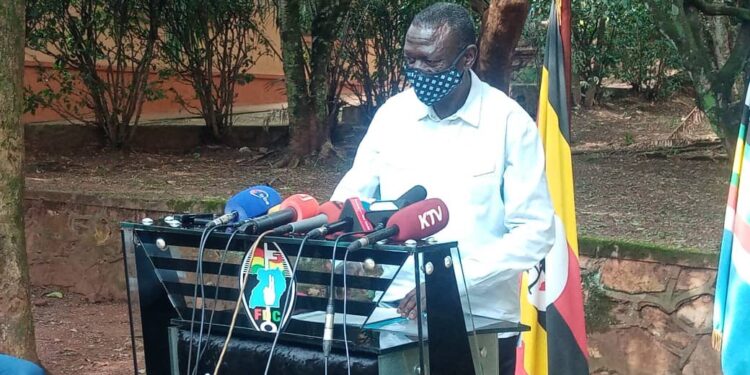Former Ugandan opposition leader Kizza Besigye’s views on Covid-19 have been both prodigious and intensely revealing. A trained physician, the concoction that he proffered as a Covid-19 immunity booster was immortalised and endlessly recalled during Uganda’s second coronavirus wave when the wailing of ambulances cut into Kampala’s soul.
The 65-year-old politician used a media briefing during the first workweek of August to voice his worries about educational forfeits occasioned by the pandemic. Schools in Uganda shut their doors to coronavirus for the second time shortly before the second wave blindsided the country in June. In a pushback that was mostly visceral, Besigye concluded that classrooms are safe to reopen. He decried the possibility of losing a disproportionately big number of pupils to enrolment if the status quo is maintained.
At the August 5 media briefing, he said, “The biggest crime this government has ever done is refusing to reopen schools. There is absolutely no justification for the measures that have been taken in education.
“It is the basic knowledge about Covid that the least vulnerable are the young. The greatest majority of them will suffer without knowing Covid entered [their bodies]”.
Besigye, essentially, did not back the claim he made about Covid-19 paediatric infections with hard information. He instead used evidence that at best is anecdotal and at worst rests on a cornerstone of conjecture to dismiss Covid-19 as something of a run-of-the-mill pathogen in children. Unfortunately, there is only a modicum of information about Covid-19 paediatric infections in Uganda. In the rich world, the portrait being sketched is one that has children as both victims and vectors of the Delta variant’s infectiousness.
Hard information from the US Centers for Diseases Control and Prevention makes for grim reading. Children have contributed significantly (more than one third) to the United States’ weekly caseload, with more than four million testing positive for the virus. Since August, the latest Covid-19 variant surge in the country has left newborns to 17-year-olds totalling nearly 45,000 hospitalised. Deaths are closing in on the 400 mark.
Even in Uganda where — as noted earlier — datasets on paediatric COVID-19 patients are hard to come by, a modicum of empirical evidence puts children at the vanguard of a more ominous shift. The surge in cases, which climaxed in a vicious second wave where hospitals ran out of oxygen and ICU beds, was first profoundly felt in education institutions. Covid-19 tore through several schools, including acclaimed ivory towers. By early June, 948 cases had been collated from 43 schools across 22 districts. Some parents and guardians offered anecdotal evidence of young people entrusted to their care getting severely ill with Delta.
Globally, there has been an impassioned discussion around making available a shield of protection for young people. While it has split the world down the middle, the race to validate paediatric vaccines nevertheless continues apace. In May, the US Food and Drug Administration gave the green light to the Pfizer/BioNTech vaccine for emergency use in 12- to 15-year-olds. A paediatric trial for six-month to 11-year-olds is also underway.
Besigye is right to conclude that it is ambitiously naive to peg a back-to-school plan to inoculations since the supply of Covid-19 vaccines in Uganda is vanishingly small. He is also right in holding that jabbing adults who spend a disproportionate amount of time around pupils provides a shield of protection. A glaring absence from his back-to-school plan, though, was the pertinent issue of ventilation.
Unfortunately, the design of most classrooms dotting Uganda encourages superspreading. Because most of them are in a sense poorly ventilated spaces, major improvements to classrooms are of the essence. A recent study by The Economist showed that well-thought-out mechanical ventilation (fans and filters have to be elevated above people in the room) coupled with mask-wearing can push safe time in a classroom upwards of 80 hours.
OUR VERDICT
Besigye said, “It is the basic knowledge about Covid that the least vulnerable are the young. The greatest majority of them will suffer without knowing Covid entered [their bodies]”.
While the body of knowledge from past coronavirus waves showed that children were being burdened for the sake of protecting older people, the transmissibility of the Delta variant has well and truly prompted a rethink. The picture has drastically changed. Besigye, however, said schools are fairly low-risk and need to be reopened. The evidence we have proffered suggests otherwise.
We therefore rate Besigye’s statement Mostly False.
__________________________________
OUR SOURCES
American Academy of Pediatrics, Children and COVID-19: State-Level Data Report, August 8, 2021
Bloomberg, “Are We Vaxxed Yet?”, August 9, 2021
Centers for Disease Control and Prevention, Families & Children, updated August 2, 2021
Daily Monitor, “Besigye Unveils Back-to-School Plan”, August 6, 2021
Daily Monitor, “Schools in a Fix Over Covid-19”, June 1, 2021
Health Policy Watch, “Uganda Enters New Lockdown as COVID-19 Cases Soar”, June 6, 2021
Kizza Besigye tweet, June 1, 2020
Newsweek, “The Doomsday Variant”, August 13, 2021
The Economist, “Surface to Air”, May 29, 2021
U.S. Food & Drug Administration, Coronavirus (COVID-19) Update: FDA Authorizes Pfizer-BioNTech COVID-19 Vaccine for Emergency Use in Adolescents in Another Important Action in Fight Against Pandemic, May 10, 2021


